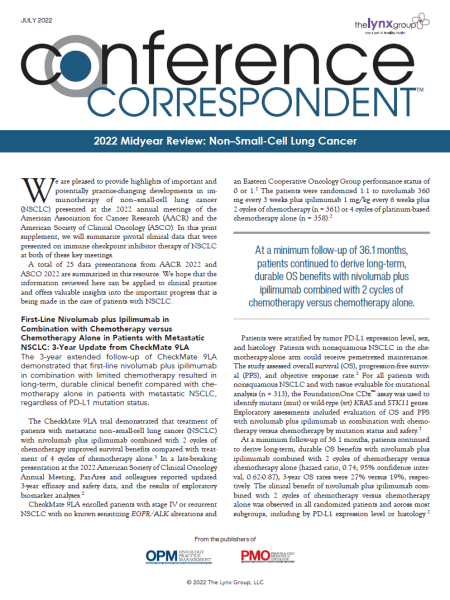The oncogenic driver, KRAS, is the most frequent mutation in patients with non–small-cell lung cancer (NSCLC).1 According to research, only KRAS mutations and KRAS mutations in combination with STK11 define separate NSCLC subgroups that respond differently to immune checkpoint inhibitors.1
Previous efforts to find therapeutics to offset the oncogenic effects of KRAS mutations have mostly failed, and malignancies caused by KRAS have been among the most resistant to treatments.2 A study was undertaken in China between May 2017 and May 2020 to investigate the mechanism of immune checkpoint inhibitor efficacy in these subgroups of Chinese patients with NSCLC by analyzing the tumor immune microenvironment and a number of biomarkers.1
This study comprised formalin-fixed paraffin-embedded specimens from patients with cancer who underwent next-generation sequencing. Next-generation sequencing was used to detect gene mutations, and a 733-gene panel was used to determine tumor mutational burden (TMB).
A total of 3323 Chinese patients with NSCLC were admitted for next-generation sequencing and tumor immune microenvironment analysis, with 1002 samples accessible for TMB analysis, 796 samples for PD-L1 expression analysis, and 19 samples available for tumor immune microenvironment evaluation. Three subgroups were identified: those with only KRAS mutations, those with only STK11 mutations, and those with both KRAS and STK11 mutations. The median TMB level in the co-mutation group was slightly lower than in the other groups, but there was no significant difference in the TMB levels of the 3 subgroups. The amount of PD-L1 expression in the KRAS mutant group was considerably higher than in the STK11 mutation or co-mutation groups (P <.001). Furthermore, multiple immunohistochemistry demonstrated that the number of positive immune cells infiltrating the tumors in the STK11 and co-mutation groups was lower than in the KRAS mutation group.1
KRAS mutation–positive cancers come in a wide variety of shapes and sizes. The type of KRAS variation and existence of co-mutations have an impact on the biology of KRAS-driven illnesses.3 The study in China showed that the variation in the tumor immune microenvironment, which includes immune cell infiltrated and PD-L1 expression, can explain the divergent response to immune checkpoint inhibitors in patients with KRAS mutation and STK11 co-mutation.1 Although the treatment environment has shifted substantially, combination trials are still ongoing. Understanding the biology of resistance mechanisms is a fundamental strategy to improve the medicines available to patients.3
References
- Wang K, Zhang H, Xu H, et al. Differences of immune microenvironment among NSCLC patients with various KRAS mutation types. Ann Oncol. 2021;32(suppl 5):S983.
- Westcott PMK, To MD. The genetics and biology of KRAS in lung cancer. Chin J Cancer. 2013;32:63-70.
- Addeo A, Banna GL, Friedlaender A. KRAS G12C mutations in NSCLC: from target to resistance. Cancers (Basel). 2021;13:2541.

